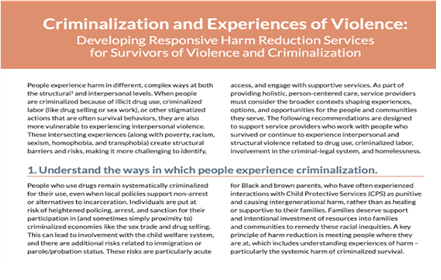People experience harm in different, complex ways at both the structural and interpersonal levels. When people are criminalized because of illicit drug use, criminalized labor (like drug selling or sex work), or other stigmatized actions that are often survival behaviors, they are also more vulnerable to experiencing interpersonal violence. These intersecting experiences (along with poverty, racism, sexism, homophobia, and transphobia) create structural barriers and risks, making it more challenging to identify, access, and engage with supportive services.As part of providing holistic, person-centered care, service providers must consider the broader contexts shaping experiences, options, and opportunities for the people and communities they serve. The recommendations are designed to support service providers who work with people who survived or continue to experience interpersonal and structural violence related to drug use, criminalized labor, involvement in the criminal-legal system, and homelessness.
- Community Based Organizations
- Viral Hepatitis
- Hepatitis


